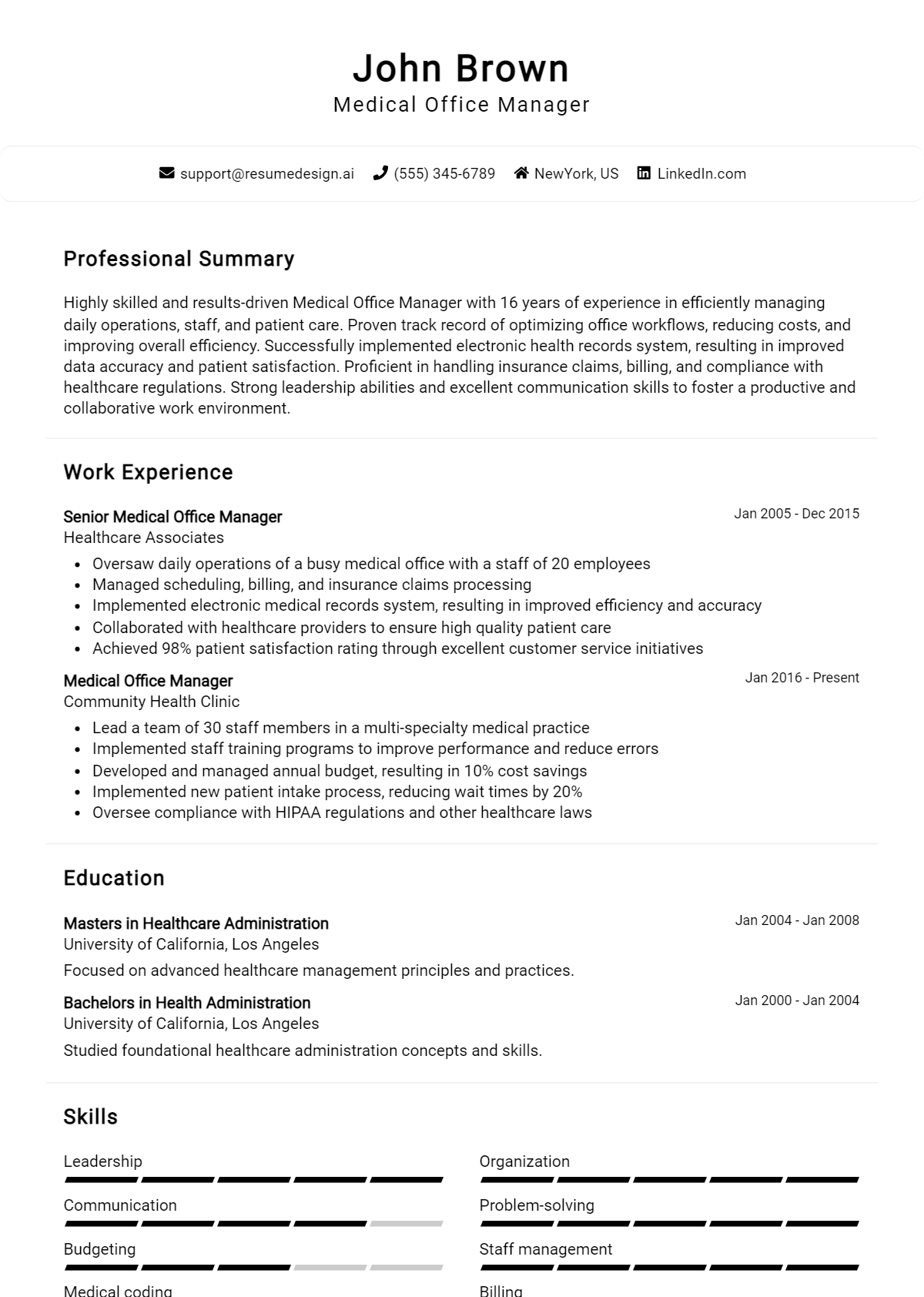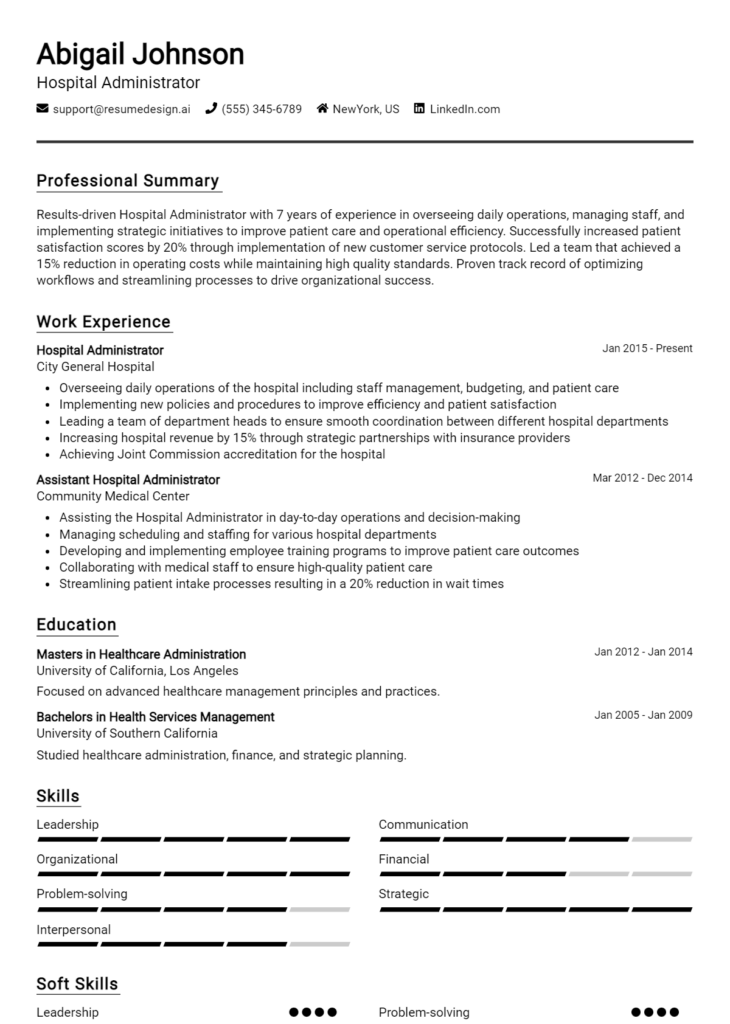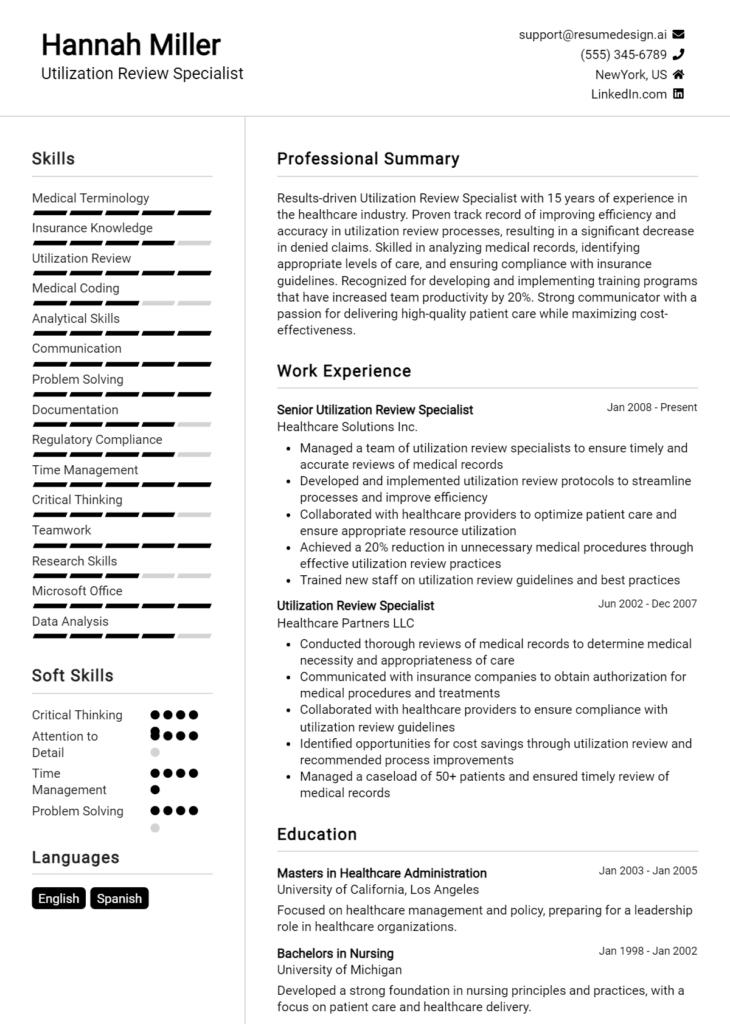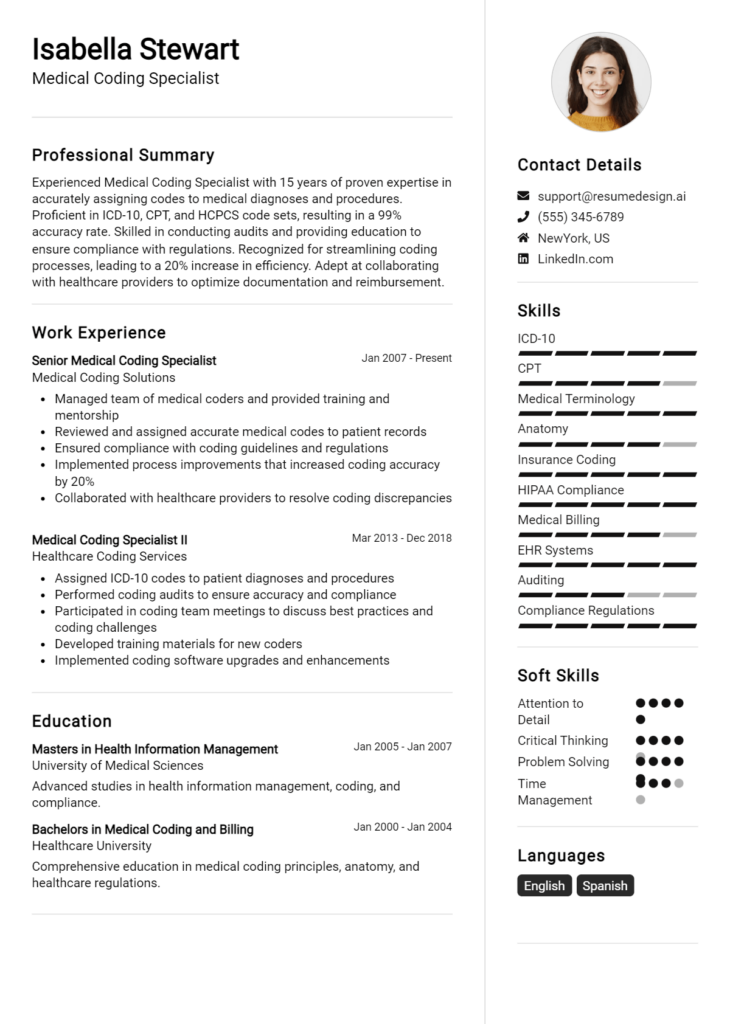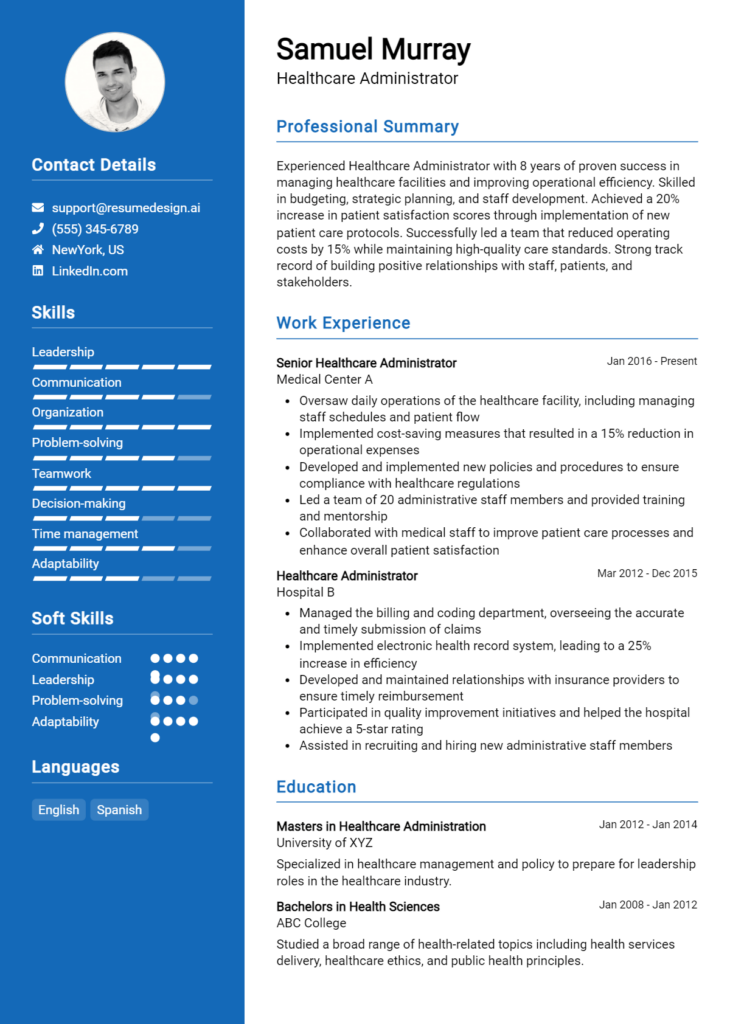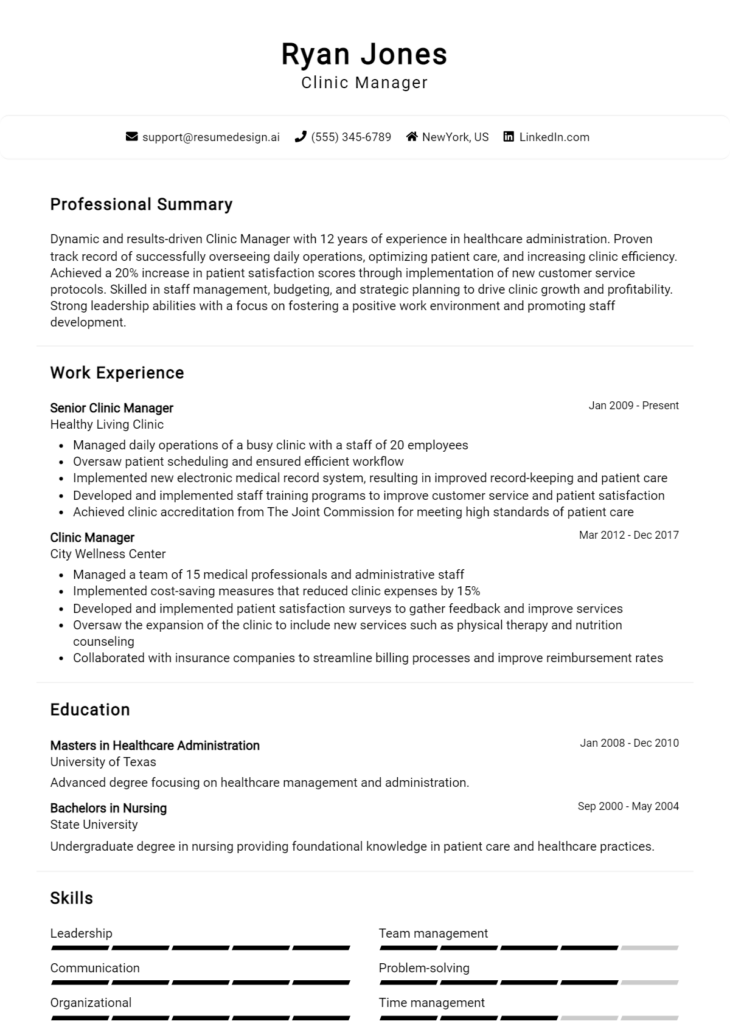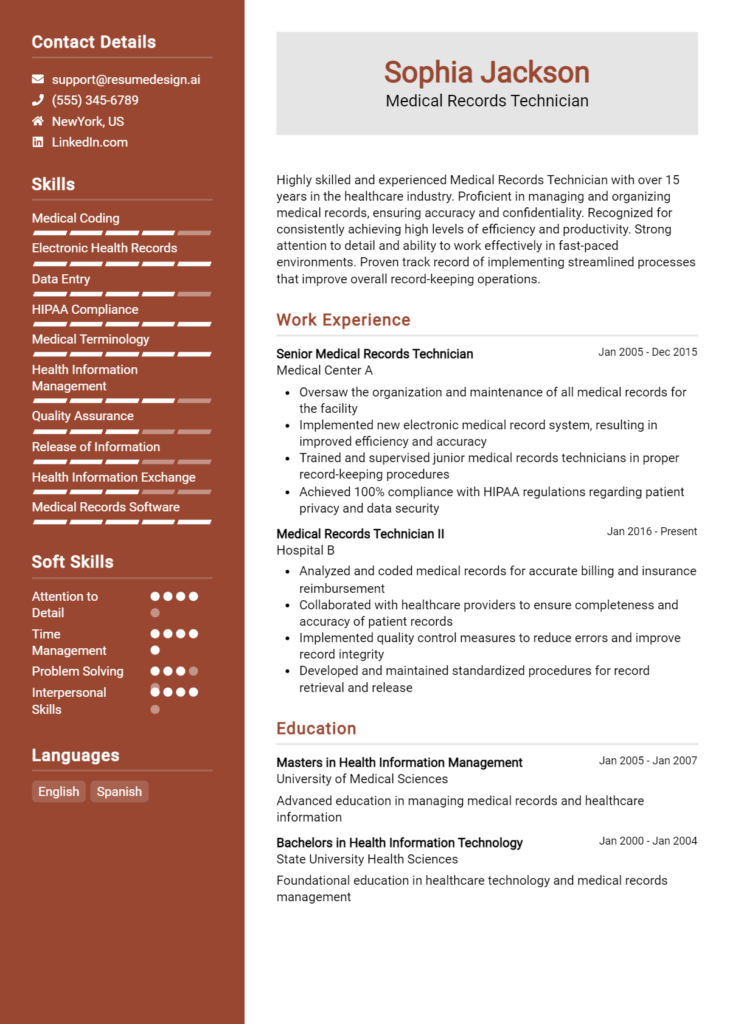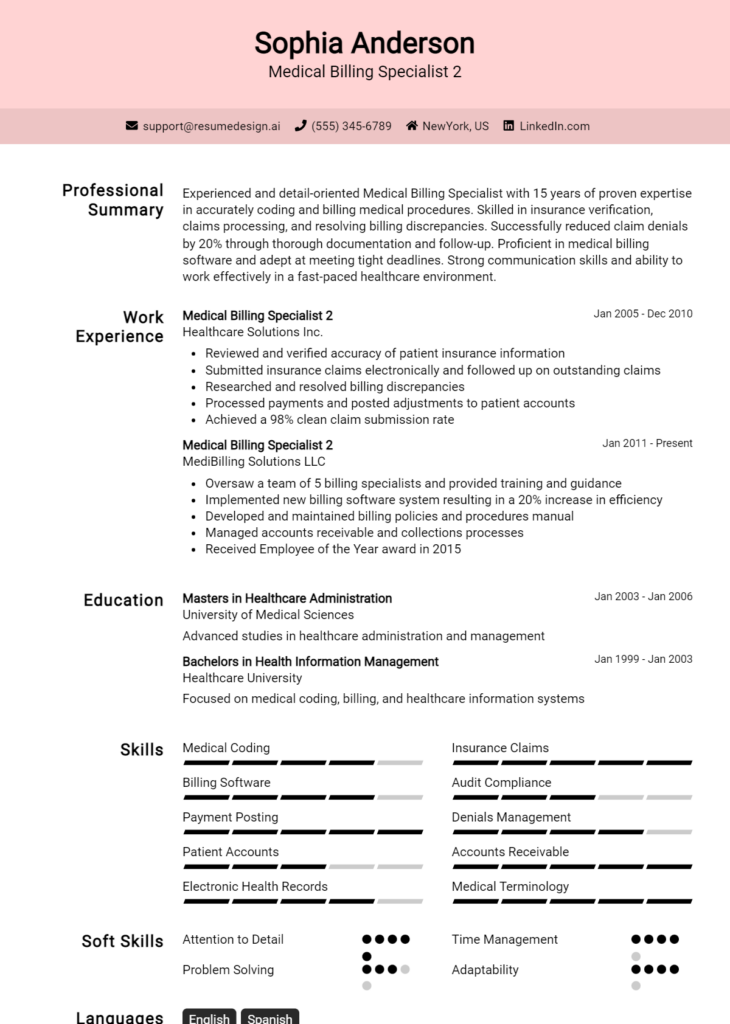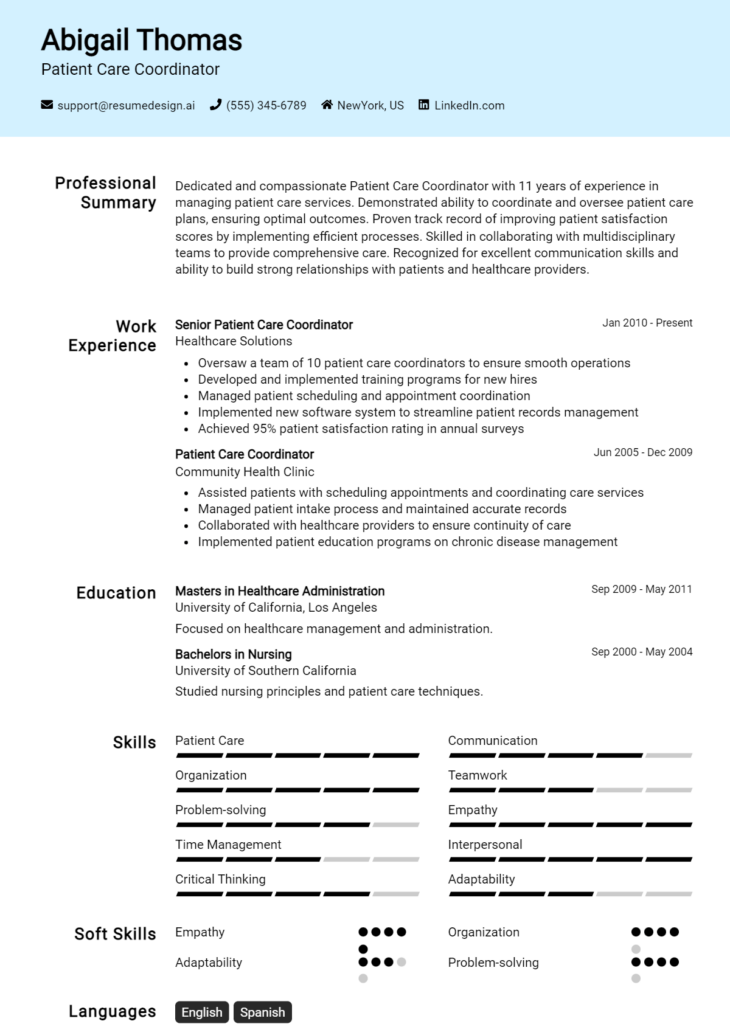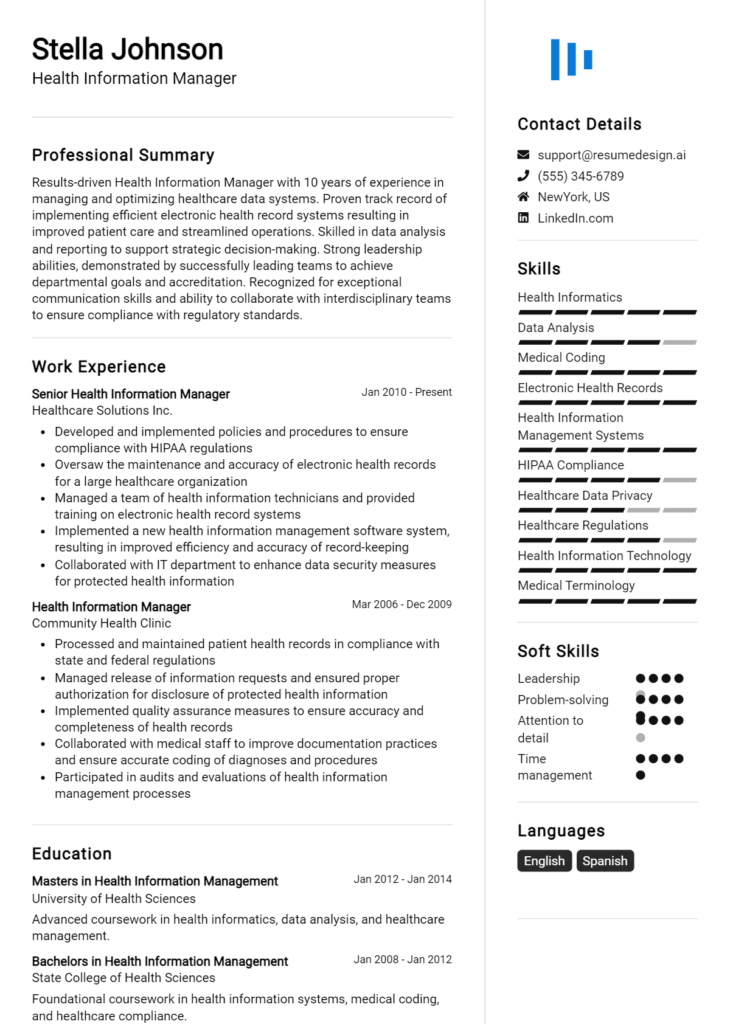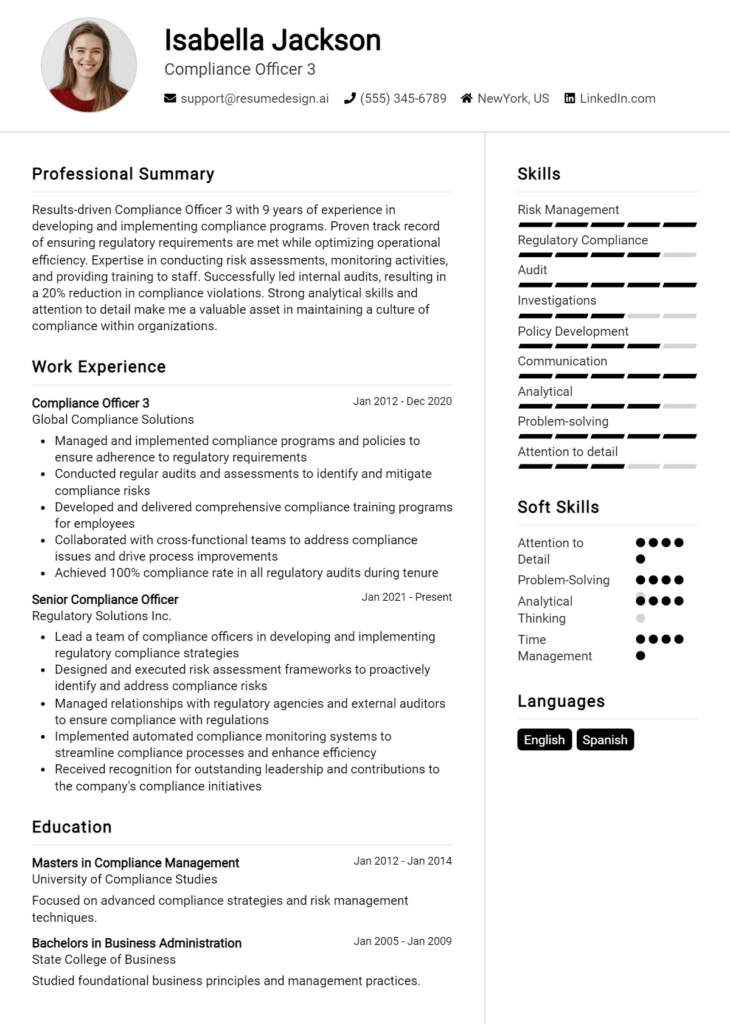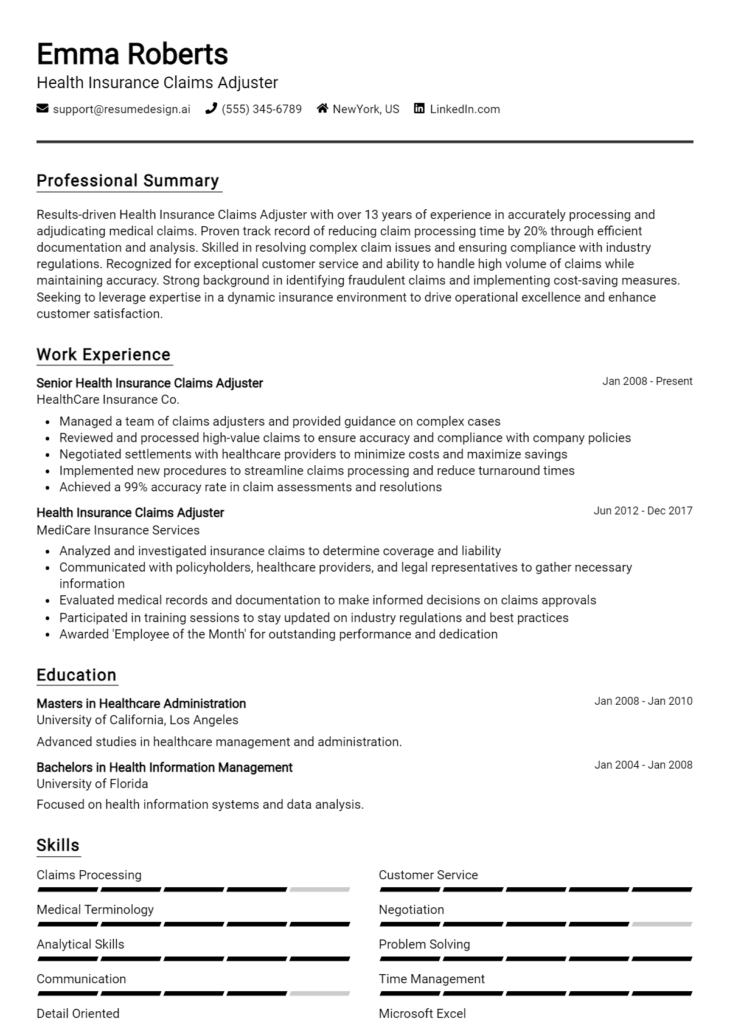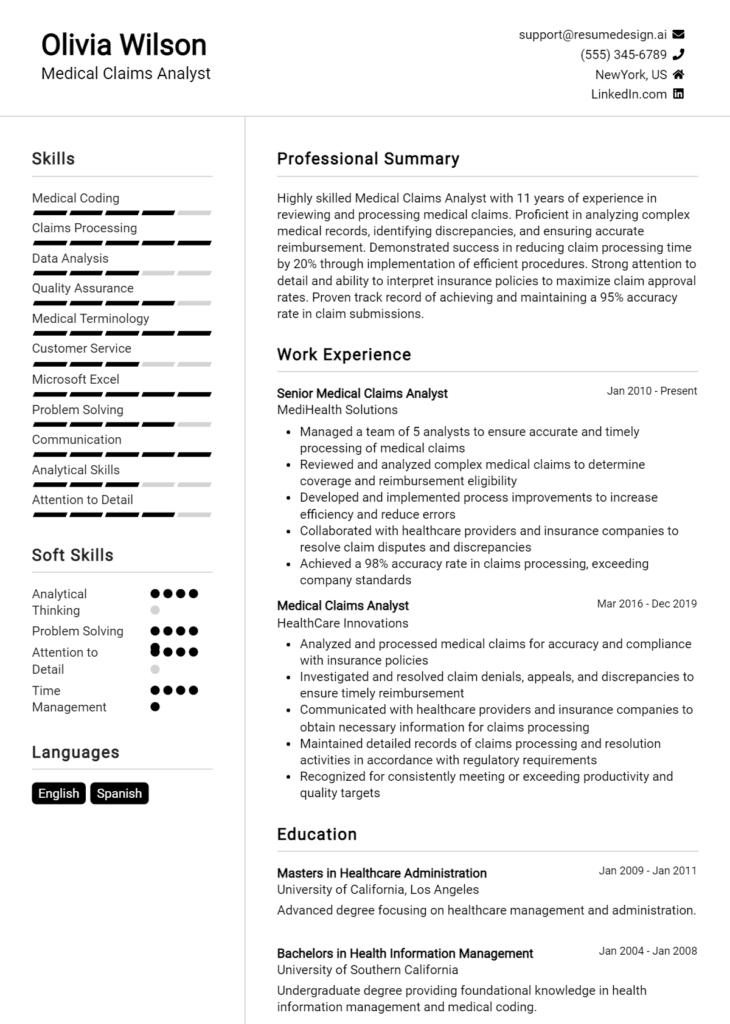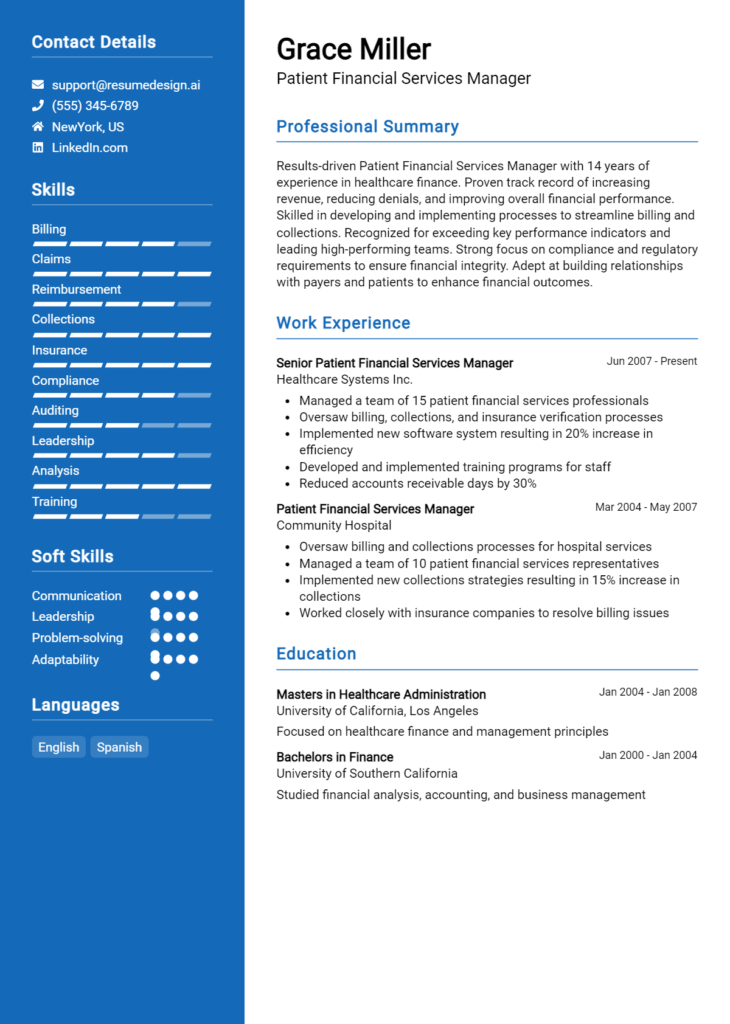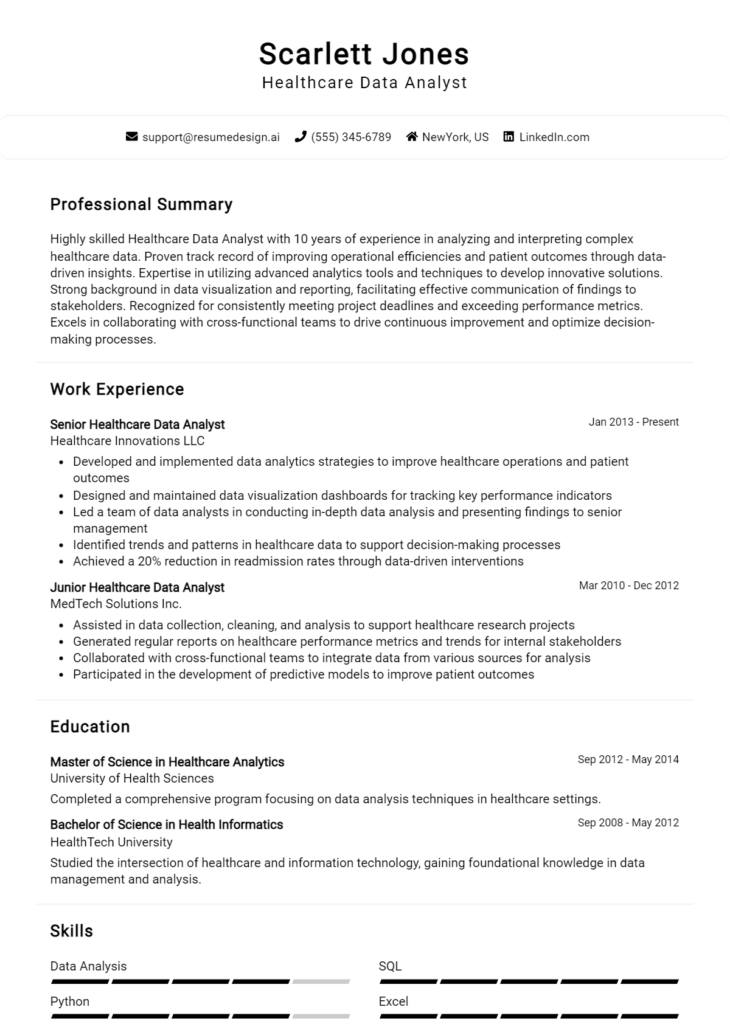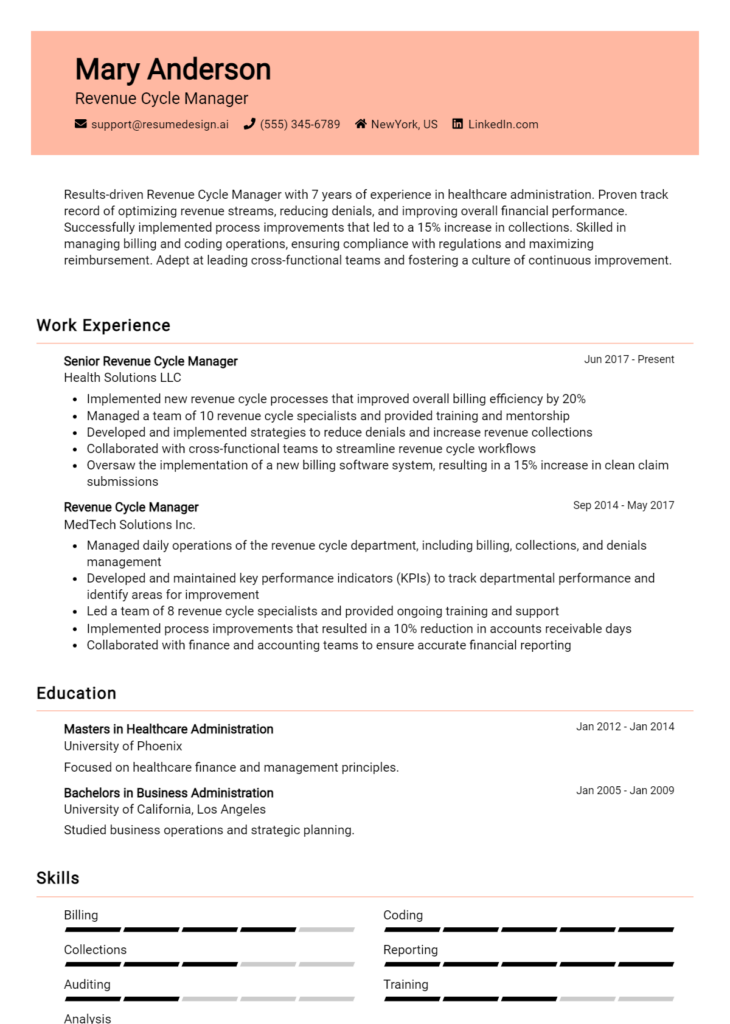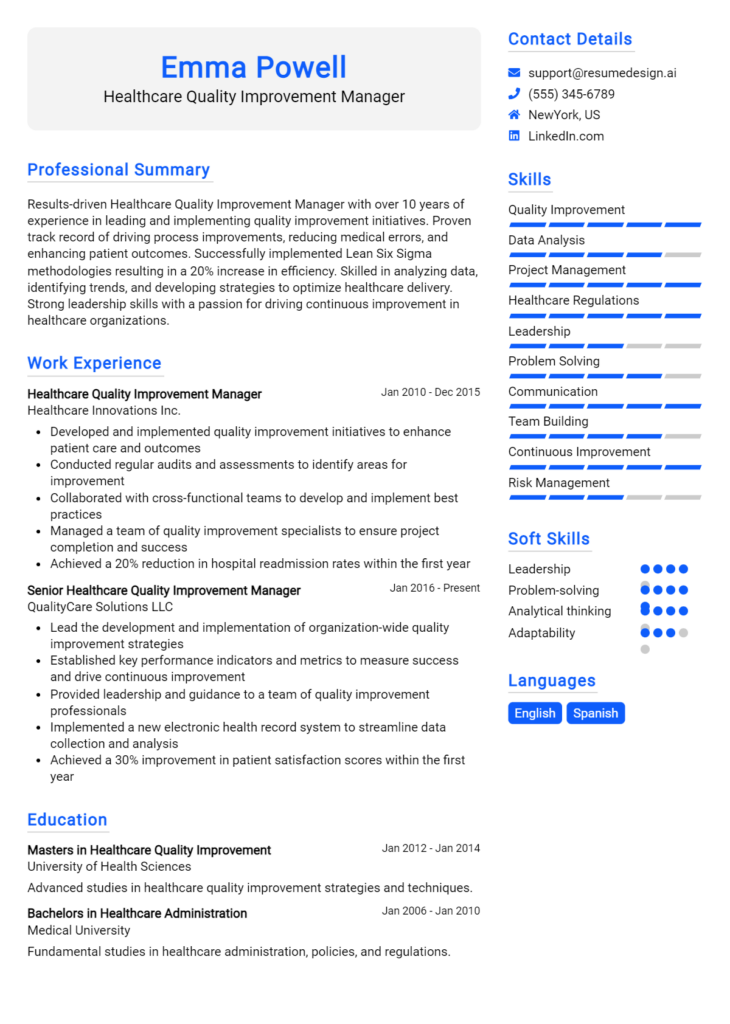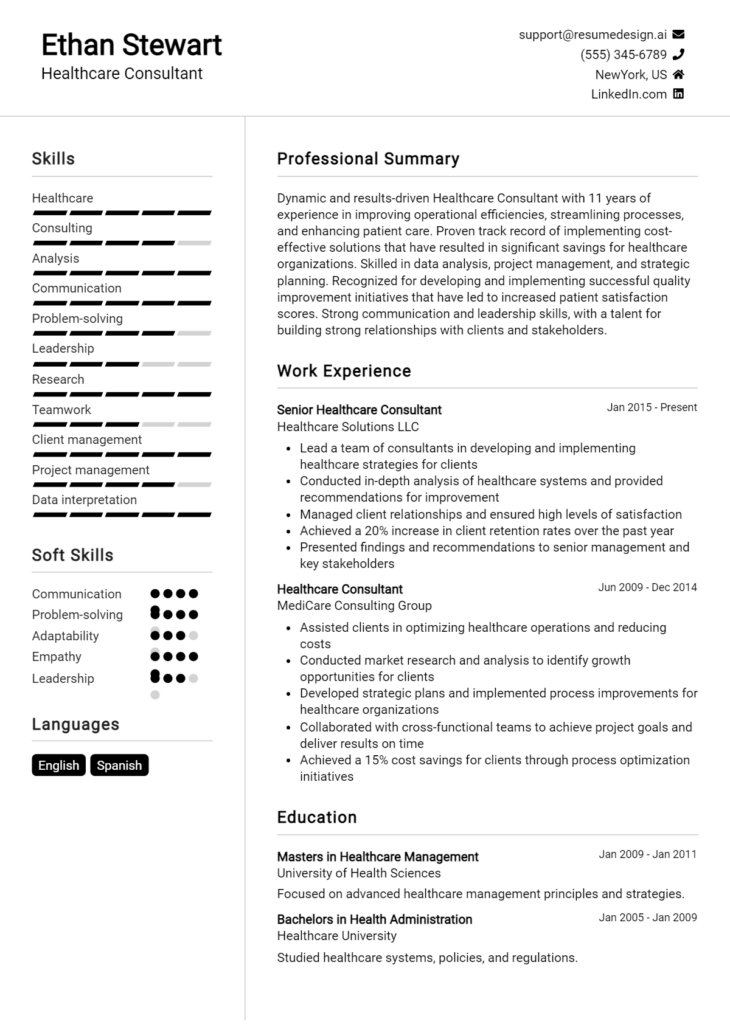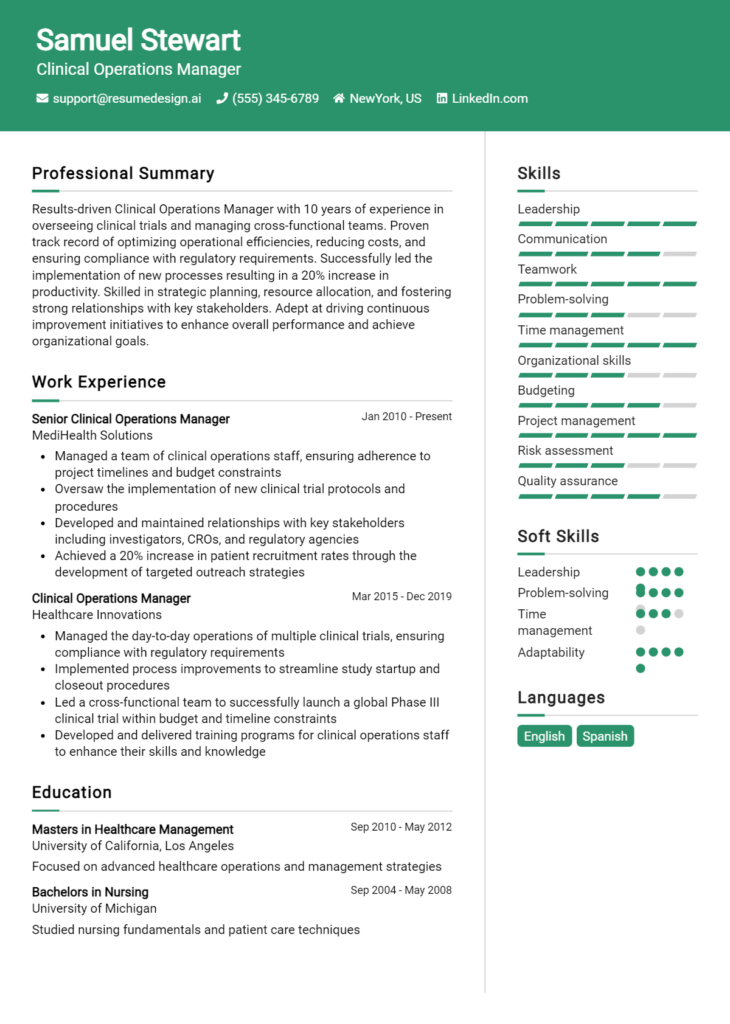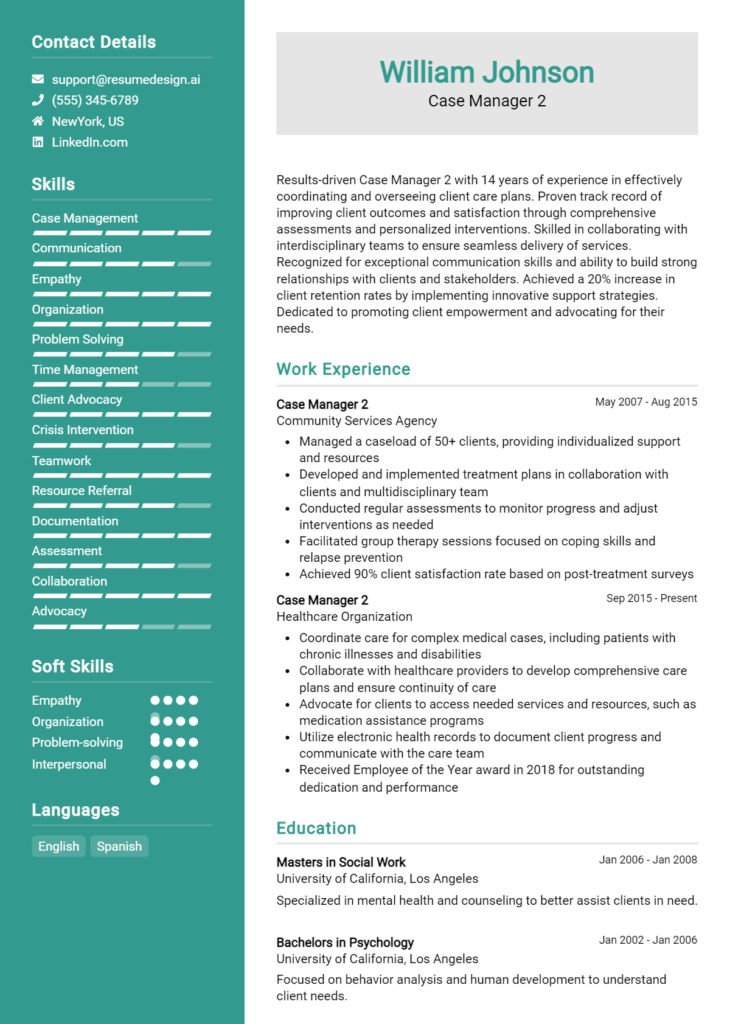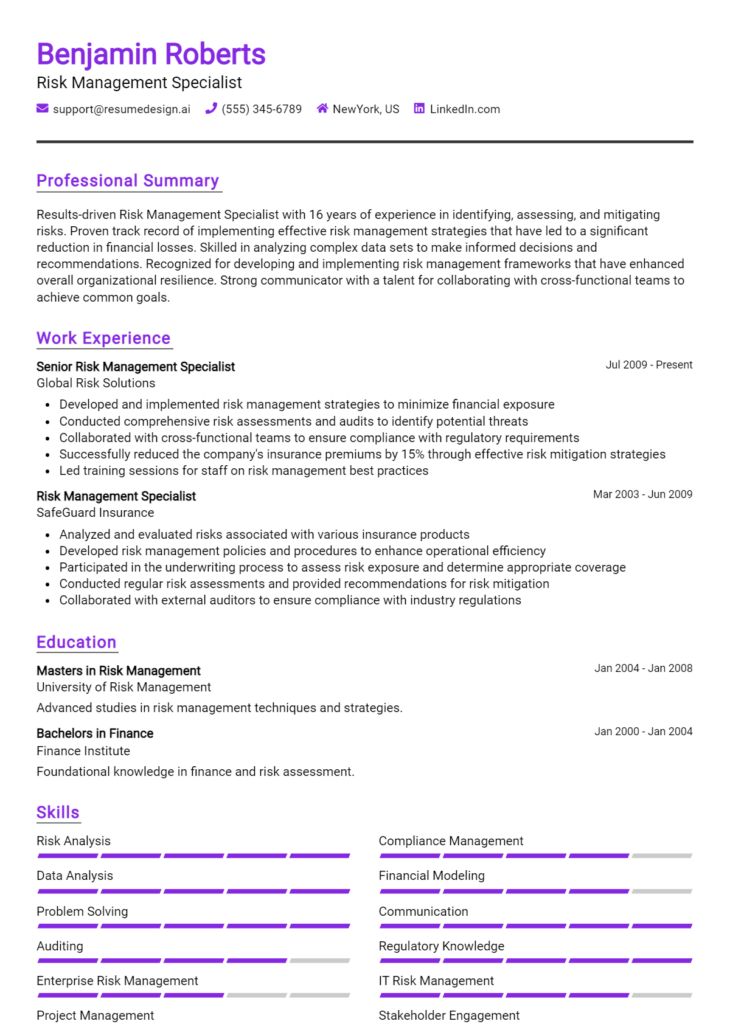Medical Office Manager Core Responsibilities
A Medical Office Manager plays a crucial role in coordinating various functions within a healthcare facility, ensuring seamless operations across departments. Key responsibilities include overseeing administrative tasks, managing patient records, and ensuring compliance with healthcare regulations. Strong technical, operational, and problem-solving skills are essential for this role, as they directly contribute to improving patient care and organizational efficiency. A well-structured resume can effectively highlight these qualifications, showcasing the candidate's ability to bridge gaps between departments and drive the organization towards its goals.
Common Responsibilities Listed on Medical Office Manager Resume
- Supervise daily office operations and staff management.
- Manage patient scheduling, billing, and insurance claims processing.
- Ensure compliance with healthcare regulations and maintain patient confidentiality.
- Oversee medical records management and electronic health record systems.
- Coordinate with healthcare providers and other departments for seamless patient care.
- Implement office policies and procedures to enhance operational efficiency.
- Monitor inventory and manage medical supplies procurement.
- Prepare and manage budgets, financial reports, and staff payroll.
- Train and mentor staff to ensure high-quality patient service.
- Address patient inquiries and resolve any complaints or issues.
- Conduct regular assessments to improve office performance and patient satisfaction.
High-Level Resume Tips for Medical Office Manager Professionals
In the competitive field of healthcare management, the importance of a well-crafted resume cannot be overstated, especially for Medical Office Manager professionals. Your resume is often the first impression you make on a potential employer, serving as a crucial tool that highlights both your skills and achievements. A strong resume not only showcases your qualifications but also reflects your understanding of the healthcare environment and your ability to manage the complexities of a medical office efficiently. In this guide, we will provide practical and actionable resume tips specifically tailored for Medical Office Manager professionals to help you stand out in a crowded job market.
Top Resume Tips for Medical Office Manager Professionals
- Tailor your resume to the specific job description, emphasizing the skills and experiences that align with the employer's needs.
- Showcase relevant experience by detailing your previous roles in medical offices, emphasizing your responsibilities and achievements.
- Quantify your achievements whenever possible, using metrics to demonstrate your impact (e.g., improved patient satisfaction scores, increased office efficiency).
- Highlight industry-specific skills such as knowledge of medical billing, coding, compliance regulations, and electronic health record systems.
- Include certifications or relevant training that pertain to medical office management, such as CMOM or CMM certification.
- Use action verbs to convey your accomplishments and responsibilities, making your resume more dynamic and engaging.
- Incorporate keywords from the job posting to help your resume pass through applicant tracking systems (ATS).
- Keep your layout clean and professional, ensuring readability with clear headings and bullet points.
- Proofread carefully to avoid any typos or grammatical errors, as attention to detail is crucial in the medical field.
By implementing these tips, you can significantly enhance your resume and increase your chances of landing a job in the Medical Office Manager field. A focused and polished resume will not only capture the attention of hiring managers but also effectively communicate your qualifications and readiness to excel in a vital role within healthcare management.
Why Resume Headlines & Titles are Important for Medical Office Manager
In the competitive field of healthcare administration, a Medical Office Manager must stand out to capture the attention of hiring managers. This is where the importance of resume headlines and titles comes into play. A well-crafted headline can significantly enhance a resume by summarizing the candidate's key qualifications in a single, impactful phrase. It serves as a powerful introduction that not only grabs the attention of employers but also provides a quick snapshot of the candidate’s expertise and suitability for the role. A strong headline should be concise, relevant, and directly aligned with the specific job being applied for, thereby setting the tone for the rest of the resume.
Best Practices for Crafting Resume Headlines for Medical Office Manager
- Keep it concise—aim for one impactful sentence.
- Make it role-specific to clearly indicate the position you're targeting.
- Use strong action verbs to convey a sense of authority and competence.
- Highlight key skills or accomplishments that align with the job description.
- Incorporate relevant certifications or years of experience when possible.
- Avoid jargon or overly complex language to ensure clarity.
- Tailor the headline for each application to match specific job requirements.
- Ensure it reflects your unique value proposition as a candidate.
Example Resume Headlines for Medical Office Manager
Strong Resume Headlines
Dynamic Medical Office Manager with 10+ Years of Experience in Streamlining Operations
Certified Healthcare Administrator Specializing in Patient Care and Staff Management
Proven Track Record in Increasing Patient Satisfaction and Revenue Growth
Weak Resume Headlines
Medical Office Manager
Experienced in Healthcare
The strong headlines are effective because they provide specific details that highlight the candidate's unique qualifications and strengths, making them memorable to hiring managers. They convey not just the role but also the candidate's expertise and achievements, which can spark interest and prompt further review of the resume. In contrast, the weak headlines fail to make an impression as they are vague and generic, lacking the necessary detail to convey the candidate’s qualifications or unique selling points. This makes it easy for hiring managers to overlook them in favor of more compelling candidates.
Writing an Exceptional Medical Office Manager Resume Summary
A well-crafted resume summary is a crucial element for a Medical Office Manager, as it serves as the first impression a hiring manager will have of a candidate. This brief introduction encapsulates key skills, relevant experience, and notable accomplishments, effectively showcasing a candidate's qualifications for the role. A strong summary is concise, impactful, and tailored to the specific position being applied for, ensuring that it captures the attention of hiring managers quickly and compels them to read further.
Best Practices for Writing a Medical Office Manager Resume Summary
- Quantify Achievements: Use numbers and metrics to highlight your accomplishments, such as improved patient satisfaction scores or increased operational efficiency.
- Focus on Skills: Emphasize relevant skills such as staff management, scheduling, billing, and compliance with healthcare regulations.
- Tailor for the Job Description: Customize your summary to align with the specific requirements and responsibilities outlined in the job posting.
- Be Concise: Aim for 3-5 sentences that deliver a clear message without unnecessary details.
- Use Action Verbs: Start sentences with strong action verbs to convey confidence and proactivity.
- Highlight Industry Experience: Include your years of experience in medical office management or related fields to establish credibility.
- Showcase Leadership Abilities: Mention any experience in leading teams or managing projects to demonstrate your leadership skills.
- Incorporate Keywords: Use industry-specific keywords that align with what employers are looking for to pass through applicant tracking systems.
Example Medical Office Manager Resume Summaries
Strong Resume Summaries
Dynamic Medical Office Manager with over 8 years of experience in optimizing office operations and enhancing patient satisfaction by 25%. Proficient in staff management, scheduling, and compliance with healthcare regulations. Proven track record of reducing patient wait times by 15% through effective resource allocation.
Results-oriented Medical Office Manager skilled in financial management and billing processes, successfully increasing revenue by 20% in the past year. Experienced in leading a team of 10 staff members, fostering a collaborative environment that improved employee retention rates by 30%.
Detail-oriented Medical Office Manager with 5 years of experience in streamlining office procedures and implementing electronic health records systems. Recognized for achieving a 95% patient satisfaction rating through exceptional communication and problem-solving skills.
Weak Resume Summaries
Experienced in managing a medical office and ensuring everything runs smoothly.
Medical Office Manager with various skills and background in healthcare looking for a new opportunity.
The examples provided illustrate the distinction between strong and weak resume summaries effectively. Strong summaries are specific, include quantifiable achievements, and directly relate to the job role, making them impactful and memorable. In contrast, weak summaries tend to be vague, lacking in detail and measurable outcomes, which diminishes their effectiveness in capturing a hiring manager's attention.
Work Experience Section for Medical Office Manager Resume
The work experience section of a Medical Office Manager resume is critical as it serves to demonstrate the candidate's technical skills, leadership capabilities, and commitment to delivering high-quality healthcare services. This section not only outlines past roles and responsibilities but also highlights the candidate's ability to manage teams effectively and improve operational processes. By quantifying achievements and aligning experiences with industry standards, candidates can present themselves as valuable assets to potential employers, showcasing their qualifications in a competitive job market.
Best Practices for Medical Office Manager Work Experience
- Use action verbs to describe responsibilities and achievements.
- Quantify results with specific metrics, such as percentage improvements or cost savings.
- Highlight technical skills relevant to medical office management, such as EMR systems or billing software.
- Focus on team management and collaboration, emphasizing leadership roles.
- Align experiences with industry standards and practices to demonstrate relevance.
- Include certifications or training that enhance your qualifications.
- Tailor your work experience to the specific job you are applying for.
- Showcase any problem-solving initiatives that led to process improvements.
Example Work Experiences for Medical Office Manager
Strong Experiences
- Successfully implemented a new EMR system that reduced patient intake time by 30%, improving overall patient satisfaction scores.
- Managed a team of 10 administrative staff, resulting in a 25% increase in productivity and a 15% reduction in operational costs over one year.
- Developed and led a training program for new hires, achieving a 95% retention rate in the first year of employment.
- Streamlined billing procedures, decreasing claim denial rates by 40%, which significantly improved revenue cycle management.
Weak Experiences
- Responsible for managing the office.
- Helped with patient scheduling and other administrative tasks.
- Worked on improving office efficiency.
- Involved in various projects and meetings.
The examples listed as strong experiences demonstrate clear, quantifiable outcomes and specific achievements that reflect the candidate's impact on their previous roles. They highlight technical leadership, process improvements, and successful team management. In contrast, the weak experiences lack detail and quantifiable results, making it difficult to gauge the candidate's contributions or effectiveness in their roles. Strong experiences provide a compelling narrative that showcases the candidate's qualifications, while weak experiences fail to convey substantial professional value.
Education and Certifications Section for Medical Office Manager Resume
The education and certifications section of a Medical Office Manager resume is crucial as it showcases the candidate's academic background and professional qualifications. This section not only highlights relevant degrees and certifications but also reflects the candidate's commitment to continuous learning and professional development within the healthcare industry. By providing detailed information on relevant coursework, certifications, and specialized training, candidates can enhance their credibility and demonstrate alignment with the job role, making them more attractive to potential employers.
Best Practices for Medical Office Manager Education and Certifications
- Include only relevant degrees and certifications that pertain to healthcare management or medical office administration.
- List your highest degree first, followed by additional relevant qualifications in reverse chronological order.
- Highlight industry-recognized certifications, such as Certified Medical Manager (CMM) or Registered Medical Office Manager (RMOM).
- Provide details on any specialized training programs or workshops that enhance your skill set.
- Incorporate coursework that is pertinent to the role, such as healthcare law, medical billing, or office management.
- Use clear and concise formatting to make the information easy to read and understand.
- Avoid listing outdated certifications that no longer hold value in the current job market.
- Consider including any professional development courses that demonstrate a commitment to staying current in the field.
Example Education and Certifications for Medical Office Manager
Strong Examples
- Bachelor of Science in Health Administration, University of XYZ, 2020
- Certified Medical Manager (CMM), 2021
- Medical Billing and Coding Certification, ABC Institute, 2019
- Coursework in Healthcare Compliance and Risk Management, 2022
Weak Examples
- Associate's Degree in General Studies, 2015
- Certification in First Aid and CPR, 2018
- High School Diploma, 2010
- Outdated certification in Medical Transcription, 2016
The strong examples provided reflect relevant educational qualifications and certifications that are directly aligned with the responsibilities and expectations of a Medical Office Manager. They showcase advanced degrees and certifications that signify a commitment to the field. In contrast, the weak examples include irrelevant or outdated qualifications that do not enhance the candidate's profile for this specific role, highlighting the importance of relevance and timeliness in educational and professional credentials.
Top Skills & Keywords for Medical Office Manager Resume
In the competitive field of healthcare, a well-crafted resume for a Medical Office Manager is crucial for standing out to potential employers. Highlighting the right skills not only showcases your qualifications but also demonstrates your ability to manage the diverse responsibilities of the role effectively. From overseeing daily operations to ensuring compliance with healthcare regulations, the skills you include can set the tone for your candidacy. Employers look for a blend of both soft and hard skills that indicate your capability in navigating the complexities of a medical office environment. For those interested in refining their resumes, integrating relevant skills and showcasing your work experience are essential steps toward landing that sought-after position.
Top Hard & Soft Skills for Medical Office Manager
Soft Skills
- Excellent communication skills
- Strong leadership abilities
- Problem-solving skills
- Time management
- Customer service orientation
- Adaptability and flexibility
- Conflict resolution
- Empathy and compassion
- Team collaboration
- Attention to detail
- Organizational skills
- Multitasking ability
- Critical thinking
- Stress management
- Interpersonal skills
Hard Skills
- Knowledge of healthcare regulations
- Proficiency in medical billing and coding
- Familiarity with electronic health records (EHR) systems
- Budget management
- Scheduling and appointment management
- Medical terminology proficiency
- Insurance verification and claims processing
- Data analysis and reporting
- Proficiency in office software (e.g., Microsoft Office Suite)
- Staff training and development
- Compliance with HIPAA regulations
- Inventory management
- Knowledge of patient care procedures
- Experience with quality assurance processes
- Project management skills
- Knowledge of office management software
- Understanding of financial reporting
- Risk management knowledge
Stand Out with a Winning Medical Office Manager Cover Letter
Dear [Hiring Manager's Name],
I am writing to express my interest in the Medical Office Manager position at [Company Name] as advertised on [where you found the job listing]. With over [X years] of experience in managing medical office operations, combined with my strong organizational and leadership skills, I am confident in my ability to contribute positively to your team and enhance the efficiency of your practice. My background in both administrative duties and patient care equips me with a unique perspective on the importance of balancing operational excellence with compassionate service.
In my previous role at [Previous Employer], I successfully oversaw the daily operations of a busy multi-specialty practice, which included managing staff schedules, coordinating patient appointments, and ensuring compliance with healthcare regulations. My proactive approach to problem-solving and my commitment to fostering a collaborative team environment resulted in a [specific achievement, e.g., 20% improvement in patient satisfaction scores]. I am adept at implementing systems and processes that streamline workflows, reduce wait times, and improve overall patient experience, which I understand is a priority for [Company Name].
I am particularly drawn to this opportunity at [Company Name] because of your commitment to [specific value or mission of the company]. I share your dedication to providing exceptional patient care and believe that a well-managed office is crucial to achieving this goal. I am excited about the prospect of bringing my expertise in staff training, budgeting, and patient relations to your organization, contributing to the continued success and growth of your practice.
Thank you for considering my application. I look forward to the possibility of discussing how I can support the mission of [Company Name] as your new Medical Office Manager. I am eager to bring my skills and experience to your team and help create an environment that prioritizes both operational efficiency and high-quality patient care.
Sincerely,
[Your Name]
[Your Phone Number]
[Your Email Address]
Common Mistakes to Avoid in a Medical Office Manager Resume
When crafting a resume for the role of a Medical Office Manager, it's essential to showcase your skills and experience effectively. However, many candidates make common mistakes that can hinder their chances of landing an interview. Avoiding these pitfalls can significantly enhance the impact of your resume, showcasing your qualifications in the best light. Here are some common mistakes to watch out for:
Lack of Specificity: Failing to include specific achievements or metrics can make your resume generic. Instead of saying you “improved office efficiency,” quantify it with “reduced patient wait times by 20% through streamlined scheduling.”
Ignoring Keywords: Many healthcare facilities use applicant tracking systems (ATS) to filter resumes. Neglecting to incorporate relevant keywords from the job description can result in your resume being overlooked.
Overloading with Jargon: While it's important to demonstrate familiarity with medical terminology, overusing jargon can confuse the reader. Strive for a balance that showcases your knowledge without alienating hiring managers.
Inconsistent Formatting: A cluttered or inconsistent format can detract from the professionalism of your resume. Use clear headings, bullet points, and a uniform font to ensure readability.
Vague Job Descriptions: Providing overly general descriptions of your past roles can leave hiring managers unsure of your actual contributions. Be specific about your responsibilities and the impact you had.
Neglecting Soft Skills: While technical skills are crucial, soft skills such as communication, leadership, and problem-solving are equally important. Failing to highlight these can make your resume less compelling.
Too Lengthy or Too Short: Striking the right balance in resume length is key. A resume that is too long may bore the reader, while one that is too brief may fail to convey your qualifications adequately. Aim for a concise yet comprehensive overview of your experience.
Omitting Relevant Certifications: In the medical field, certifications can set you apart from other candidates. Not including relevant certifications, such as Certified Medical Manager (CMM), can diminish your qualifications.
Conclusion
As we explored throughout this article, the role of a Medical Office Manager is multifaceted, requiring a unique blend of administrative skills, healthcare knowledge, and interpersonal abilities. Key responsibilities include overseeing daily operations, managing staff, ensuring compliance with regulations, and enhancing patient care experiences. The importance of effective communication, organizational skills, and familiarity with medical software cannot be overstated in achieving success in this pivotal role.
In light of these insights, now is the perfect time to evaluate and refine your Medical Office Manager resume. A well-crafted resume can significantly enhance your chances of landing that desired position. To assist you in this endeavor, we encourage you to explore the following resources:
- Resume Templates: Access professionally designed templates that can help you create a visually appealing resume.
- Resume Builder: Utilize our intuitive resume builder tool to easily construct a resume tailored to your unique experiences and skills.
- Resume Examples: Review examples of successful resumes for Medical Office Managers to inspire your own.
- Cover Letter Templates: Craft a compelling cover letter that complements your resume and showcases your qualifications.
Take action today to ensure your resume reflects your expertise and readiness for the challenges of a Medical Office Manager role!

